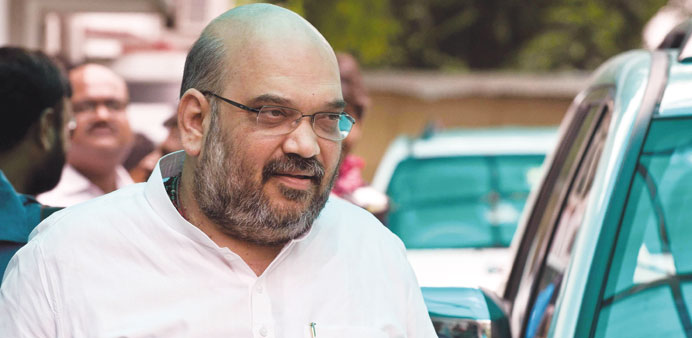Agencies/New Delhi
The Samajwadi Party and the Congress yesterday opposed the Election Commission’s decision to revoke a ban on campaigning and public rallies by BJP general secretary Amit Shah, raking up a controversy.
The Samajwadi Party (SP) accused the election commission of working at the behest of the Bharatiya Janata Party, while the Congress said both Shah and senior SP leader Azam Khan, who too was banned from holding public meetings, were equally communal.
The two leaders were banned by the election commission from electioneering at public rallies for their hate speeches, invoking religious sentiments.
However, in a statement released late Thursday, the poll panel said the ban on Shah has been modified and while he would be allowed to hold rallies, these would be closely monitored.
“The commission ... has decided to modify its order dated April 11, 2014, to the effect that permission may be granted for holding any public meetings, public processions, public rallies, road shows, etc,” election authorities stated in an order addressed to Shah.
Speaking earlier this month in Uttar Pradesh, Shah was recorded telling voters to reject parties with Muslim candidates.
The commission stated that it was lifting the ban partly because Shah had lodged an appeal in which he vowed not to use “abusive or derogatory language” and that it would monitor his campaigning using video tracking.
“I undertake on oath that I shall not use abusive or derogatory language in the campaign and shall not make any utterances violating the MCC (model code of conduct),” Shah said in his apology letter to the commission.
Uttar Pradesh is home to 134mn registered voters, more than the entire population of Japan. One in every six Indian voters lives in the state, which accounts for around a seventh of parliamentary seats.
Hindu-Muslim relations have been a tense campaign issue in the election, with critics accusing Modi, the chief minister of Gujarat, of not doing enough during religious riots there in 2002. More than 1,000 people, mostly Muslims, died in the violence.
Modi has always denied the accusations and a Supreme Court inquiry did not find enough evidence to prosecute him.
In an interview with ANI television news agency this week, Modi said he did not have personal aides and referred to Shah as a hard worker and a self-made man.
Samajwadi Party leader Naresh Agarwal, however, condemned the election commission’s decision, calling the poll panel partial.
“We strongly condemn it. It seems the election commission has also become partial and is working at the behest of Narendra Modi and the BJP,” Agarwal, a Samajwadi Party Rajya Sabha member, said.
“We will fight against this, the ban on Azam Khan is unfair, he did not say anything as provoking as Amit Shah did,” he said.
Azam Khan, a popular Muslim leader from Uttar Pradesh, said the commission did not consider his reply.
“They did not consider my reply and took very strong action against me,” he said.
Congress spokesperson Abhishek Manu Singhvi said there is no difference in what Azam Khan and Amit Shah said, but refused to make any comment on the commission action.
“I will not comment on the decision taken by a constitutional body, but for us there is no difference in Amit Shah and Azam Khan. Both are two sides of the same coin, both are communal,” Singhvi said.
The Bharatiya Janata Party (BJP), which has named Modi as its candidate to become prime minister, is forecast to emerge as the clear leader after India’s five-week general election that ends on May 12. Results are due on May 16.
A series of opinion polls this year has forecast that the BJP and its allies will win the biggest chunk of the 543 parliamentary seats up for grabs but fall short of a majority.
One large poll this week predicted they would scrape a majority.

